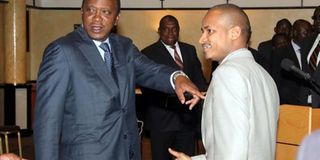Suicide letters, brawls expose rot in varsities

President Kenyatta and student leader Paul Ongili on July 16, 2015. PHOTO | JEFF ANGOTE |
What you need to know:
- Mainstream media is to blame, says student leader.
- Rambling note to Obama and ethnic scuffles over student leadership rile Uhuru and society.
It lasted 35 seconds: an exchange on Thursday between President Uhuru Kenyatta and Mr Paul Ongili, chairman of the Students’ Union of the University of Nairobi.
The encounter was characterised by a fire-breathing President and a submissive Mr Ongili — popularly known as Babu Owino.
The President bluntly told him that a letter he had written on Monday asking US President Barack Obama to visit his university during his trip to Kenya was “nonsense”.
“Unaandika mabarua ya upuuzi (You write stupid letters),” Mr Kenyatta told a taciturn Mr Ongili in reference to the letter the latter had addressed to US Ambassador Robert Godec, and which was circulated online.
Mr Ongili told Mr Kenyatta not to worry.
The brief exchange ended with Mr Kenyatta inviting Mr Ongili to State House for dinner, saying he knew that was Mr Ongili’s plan all along. The cowed student leader laughed sheepishly and said, “Mambo iko sawa (All is well).”
Coming from the man who chairs the Kenya University Students’ Organisation (Kuso), the letter is raising questions on whether university students are getting too desperate in their bid to be heard. Or whether triviality has corroded the voice of students that was once so strong it saw learners jailed by the government.
This is compounded by the fact that besides the letter that Mr Ongili had written — saying students would commit suicide and deface a tree Mr Obama planted outside Taifa Hall in 2006 if he failed to visit the university — he had written another to the President in June, where he sought permission to burn clinics that abet illegal abortions in Nairobi. “I look forward to your prompt response and provision of enough petrol,” Mr Ongili had said.
While Mr Ongili’s second-in-command at Kuso, Mr Charles Okusimba, praises him for using the only good channel during these “desperate times of media black-outs”, former University of Nairobi student leader Wafula Buke thinks it is a manifestation of lack of direction in present-day student leadership.
Branding expert Boniface Ndagwa, who co-owns advertising firm Perfect Vision Group, told Sunday Nation that Mr Ongili used the “guerrilla tactics” marketing strategy, likening his antics to those of publicity seekers who run semi-naked in packed stadia.
As Mr Ongili’s letter was doing the rounds on the Internet, Moi University hit the headlines when it was closed on Monday after students scuffled along ethnic lines following a disagreement over polls.
VIOLENT FACE-OFF
Moi University Students’ Organisation chairman Geoffrey Omondi said the fracas started when a candidate who had been nominated for the academics docket opted for the entertainment position at the last minute, which caused a face-off between members of two ethnic groups.
Mr Buke, one of the brains propelling the ODM party, said the framing of Mr Ongili’s letters and the Moi University incident were proof that the once-dreaded students’ voice is long dead.
“Student leaders of today are on trial. Where are they in the fight against corruption? Where are they in the fight for democratisation and against insecurity?” Mr Buke asked.
Saying he missed the time when universities were barracks for change, Mr Buke wished the current crop of students could choose which political divide to support — as happened when he was a student leader in 1987 before he was locked up in jail. “In 1980, when doctors went on strike, students joined them in support. And in 1979, there was a demonstration against multinationals for exploiting Kenyans. Where is such activism?” he asked.
Asked whether the creation of more universities was to blame for the trend, Mr Buke said: “That is power, in fact. I wish we had such a thing. By being many, it means they can respond to issues pertaining to their local governments and to the national government.”
In defence of university students, Mr Okusimba, the Kuso secretary-general, blamed the media for not taking seriously the statements issued by university students.
“It is because of the change of times. We talk about these issues but the media is not giving us coverage,” he said, though he admitted that the students’ voice was waning and that they were trying hard to revive it.
Moi University lecturer Christopher Odhiambo, who says it was by a stroke of luck that his car did not suffer a smashed screen during the Monday clashes, reminisces about the times when students would go to the streets and everyone would listen to them.
“The students stood for something that was significant to society. They spoke for the voiceless and confronted evils in society. It was kind of speaking the truth to power,” said Prof Odhiambo, who has been a lecturer for 22 years.




